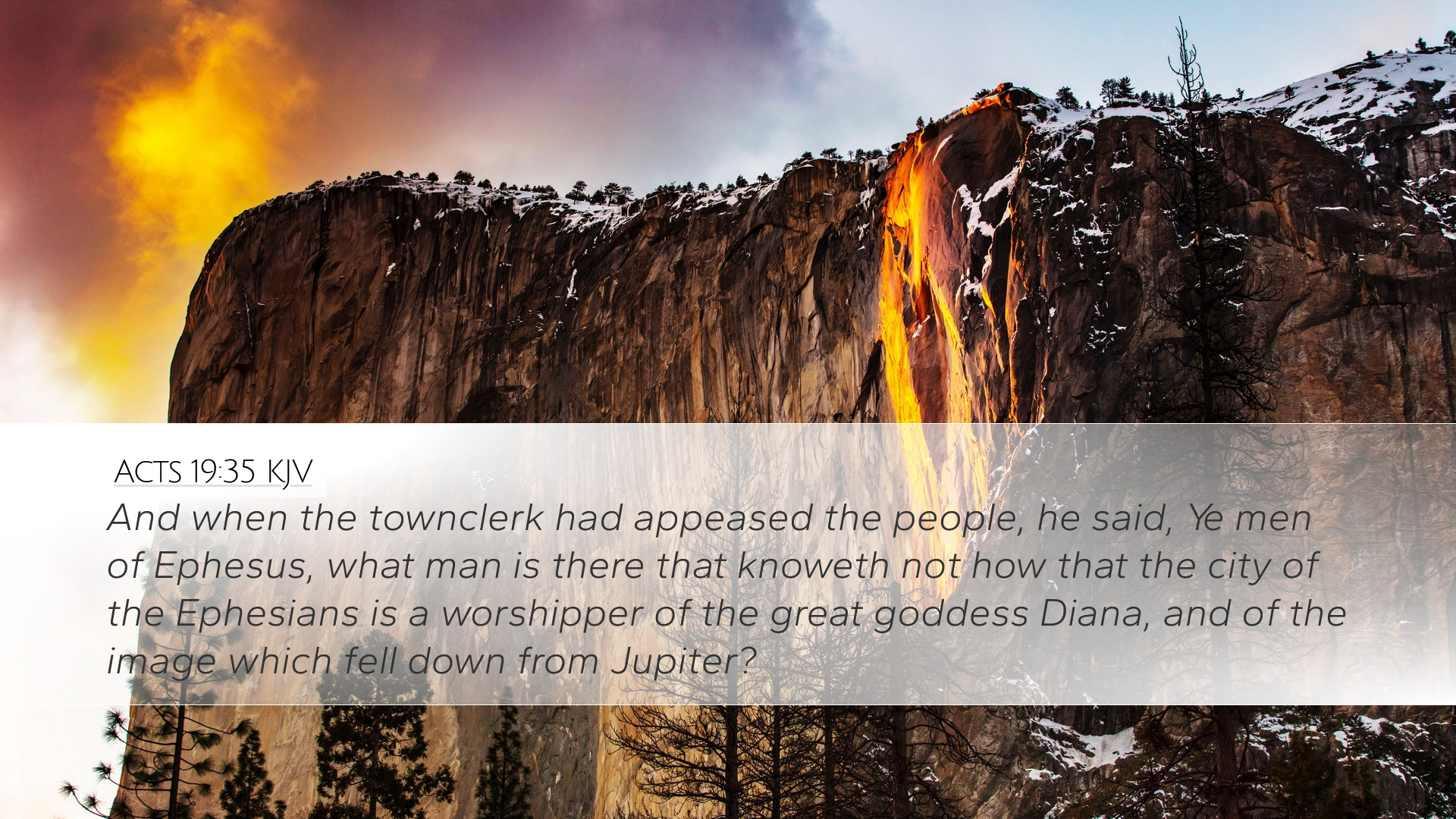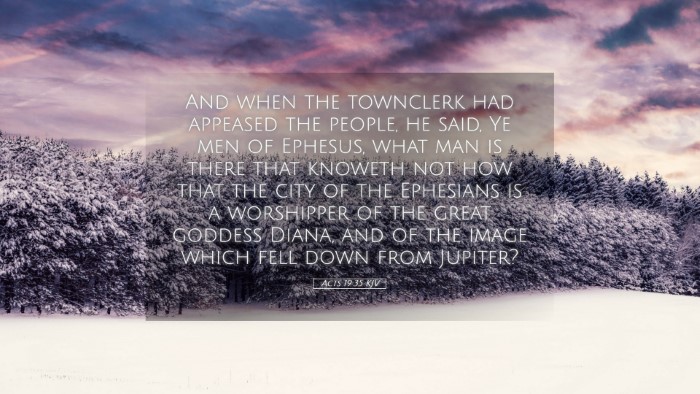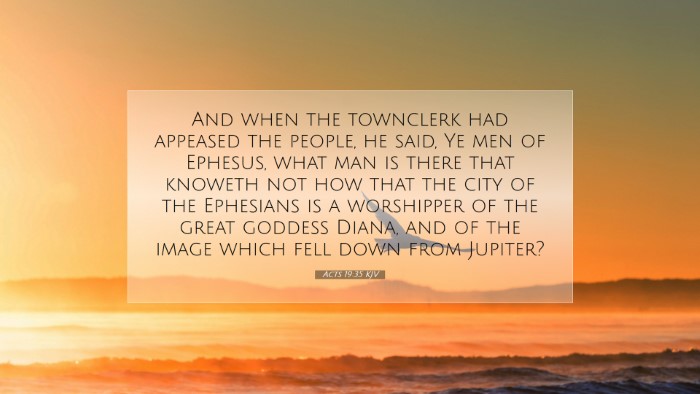Commentary on Acts 19:35
Bible Verse: Acts 19:35 (KJV)
"And when the town clerk had appeased the people, he said, Ye men of Ephesus, what man is there that knoweth not how that the city of the Ephesians is a worshipper of the great goddess Diana, and of the image which fell down from Jupiter?"
Context and Background
In order to comprehend the significance of Acts 19:35, it is fundamental to understand the context in which this event occurs. The apostolic mission in Ephesus reached a critical point as tensions rose among the silversmiths, instigated by the preaching of Paul and the ensuing conversion of many Ephesians. The resultant decline in the worship of Diana (or Artemis) posed a direct threat to the economy revolving around her temple, which was one of the Seven Wonders of the Ancient World.
The town clerk's intervention highlights the civic structure of Ephesus, demonstrating both the authority of public officials and the intricate relationship between local governance and religious practices.
Interpretation of Key Terms
- Town Clerk: The Greek term “grammateus” denotes a municipal officer responsible for maintaining order and overseeing local governance. His role is crucial as he represents the voice of measured authority amidst public disorder.
- Ephesians: The inhabitants of Ephesus, laden with cultural traditions and worship practices, especially centered around Diana, signify the stronghold of paganism that early Christians had to contend with.
- Diana (Artemis): Venerated as the goddess of fertility and the hunt, she embodied the spiritual and socio-economic heart of Ephesus. The reverence for her directly correlated to the city's identity and strength.
- Image which fell down from Jupiter: This refers to a belief that the temple's idol was a divine gift, emphasizing the substantial myth surrounding Diana's worship.
The Town Clerk's Rhetoric
The town clerk’s speech serves multiple purposes. Initially, he seeks to pacify the mob that had assembled in outrage against Paul and the perceived affront to their religious practices. By appealing to their common identity as Ephesians, he cleverly reframes the narrative. He emphasizes their exalted position as the worshippers of Diana, thus manipulating their collective pride and diverting their anger from Paul and the Christians.
Matthew Henry astutely notes that the clerk’s attempt to restore peace reflects a profound understanding of public sentiment. He encourages the people to consider their identity and its symbols rather than succumb to mob mentality. By questioning their motivations, he nudges them towards rational thought rather than emotional response.
Significance of the Temple of Diana
The Temple of Diana was not merely an edifice but a symbol of Ephesus’s cultural and economic identity. Adam Clarke emphasizes the impacts worship had on local commerce, elucidating that the temple’s grandeur attracted pilgrims and tourists, thus sustaining local artisans and merchants. This speaks to the intersection of faith and livelihood, illustrating how deeply intertwined these aspects were within Ephesian society.
The town clerk’s invocation of the image that had ‘fallen down from Jupiter’ connects various facets of Hellenistic beliefs, positioning Diana’s worship as deeply embedded within the cosmic order, thus reinforcing the necessity of lawful reverence as a community norm, as articulated by Albert Barnes.
Theological Implications
Acts 19:35 raises essential questions regarding the identity of believers in a hostile cultural environment. The manner in which the clerk appeals to the people's identity as Ephesians, serving the goddess Diana, starkly contrasts with the emerging identity of Christians, who professed singular allegiance to Christ. Pastors and theologians can derive valuable lessons on the nuanced dynamics of cultural engagement here.
Furthermore, this passage embodies the clash between faith and societal norms, stating silently but firmly that calls to faith might disturb established structures. The clerk symbolizes the often macro-level resistance to the transformation brought about by the Christian gospel, prompting believers to navigate their faith amidst pervasive cultural pressures.
Practical Applications for Today’s Church
- Engagement with Culture: As churches engage with contemporary societal values, there is a parallel need to articulate their faith in ways that speak to the heart of existential questions in today’s context.
- Identity Formation: Understanding one's identity as part of a larger community while remaining faithful to one’s beliefs is critical, reflecting the tension faced by early Christians.
- The Power of Rhetoric: How leaders communicate, especially in crises, can either uplift or inflame. Pastors can glean insights on the importance of measured responses, as demonstrated by the town clerk.
- Resistance and Resilience: The early church faced severe opposition yet thrived amidst adversity. This serves as a reminder of the potency of faith, underscoring the importance of perseverance in the face of cultural pressures.
Conclusion
Acts 19:35 portrays a vivid image of a community at the crossroads of identity, faith, and economics. The town clerk's wise management of a volatile situation reveals not only the immediacy of the conflict between Paul and the silversmiths but also the larger backdrop of cultural dissonance as the Christian faith took root in a polytheistic society.
As we reflect on this verse, it serves as a reminder of the ongoing journey of faith in navigating cultural landscapes, leaning into the truth of the gospel while recognizing the human struggles that accompany it.


